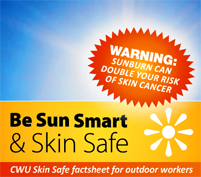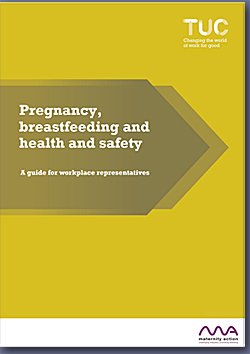Be Safe At Work During Heatwaves Especially If You Are Pregnant
The CWU's Health Safety and Environment Dept issues annual advise with regard to keeping safe at work during heatwaves, and this weekend sees a heatwave with temperatures up to 36 degrees centigrade in some parts of the UK.
 Dehydration is a real risk. It is recommended by the HSE that outdoor workers in the current temperatures need to drink around 250 ml (half a pint) every 15 minutes or 500 ml (a pint) every 30 minutes.
Dehydration is a real risk. It is recommended by the HSE that outdoor workers in the current temperatures need to drink around 250 ml (half a pint) every 15 minutes or 500 ml (a pint) every 30 minutes.
Soft fizzy drinks only serve to speed up the dehydration process and should be avoided as should alcoholic drinks at lunch times.
One aspect of working in sunshine is often forgotten - the affect of sunlight on the eyes.
Wherever possible, unless it restricts vision when doing delicate work, e.g. cable work; sun glasses should be worn to protect the eyes from sunlight. This is especially true for those with blue eyes, as they are more sensitive than brown eyes for example.
Your sunglasses should have the CE mark on them (British Standard BS EN 1836:2005) which ensures that they are giving you the right level of ultraviolet protection – so forget many of the fashion statement type sunglasses. It is also important that children’s eyes should also be protected by wearing good quality sunglasses – whether you take your kids to work with you or not!
Whilst most concern and advice given is aimed at outdoor workers, those working indoors have other problems to contend with rather than the affects of the Sun from outdoors.
Many workplaces are just inefficient when it comes to air conditioning and temperature control and this can make those workplaces hazardous, and very uncomfortable.
In particular, pregnant women are at greater risk from the bad effects of excessive heat both at work and at home. This advice from the TUC:
 "There can be increased risks to women working in high temperatures, both inside and outside. This is because, during pregnancy, the body has to work harder to cool down both the woman’s body and that of the unborn baby. This means a pregnant worker is more likely to get heat exhaustion or heat stroke sooner than a worker who isn’t pregnant. Pregnant women are also more likely to become dehydrated."
"There can be increased risks to women working in high temperatures, both inside and outside. This is because, during pregnancy, the body has to work harder to cool down both the woman’s body and that of the unborn baby. This means a pregnant worker is more likely to get heat exhaustion or heat stroke sooner than a worker who isn’t pregnant. Pregnant women are also more likely to become dehydrated."
The TUC has issued this guide for all pregnant women with regard to health and safety at work in general from which the above is quoted.
You can download the guide from the Unionsafety E-Library by clicking the picture to the left, or by using search word 'pregnancy'.
Thermal comfort is the most important factor when it comes to health and safety when working both indoors and outside.
The HSE advises that the term ‘thermal comfort’ describes a person’s state of mind in terms of whether they feel too hot or too cold.
Environmental factors (such as humidity and sources of heat in the workplace) combine with personal factors (ie your clothing) and work-related factors (how physically demanding your work is) to influence your ‘thermal comfort’.
It goes further and advises on why managing the thermal comfort of their workforce matters:
By managing thermal comfort you are likely to improve morale and productivity as well as improving health and safety. People working in uncomfortably hot and cold environments are more likely to behave unsafely because their ability to make decisions and/or perform manual tasks deteriorates.
For example:
- people may take short cuts to get out of cold environments
- employees might not wear personal protective equipment properly in hot environments increasing the risks
- an employee’s ability to concentrate on a given task may start to drop off, which increases the risk of errors occurring
As an employer you should be aware of these risks and make sure the underlying reasons for these unsafe behaviours are understood and actively discouraged and/or prevented.
Safety Reps should ensure that their employer addresses the issue of increasing temperatures in the workplace, and take appropriate action to minimise the effects upon the comfort of their workers during these periods.
Excessive heat can cause health problems in the short and long-term and as stated above, they should take care and attention to the thermal needs of pregnant employees.
USRs can download the HSE Thermal Checklist from the Unionsafety E-Library using search word 'Thermal' when assessing workplace temperatures and making representation to employers.
Source: unionsafety / CWU / HSE